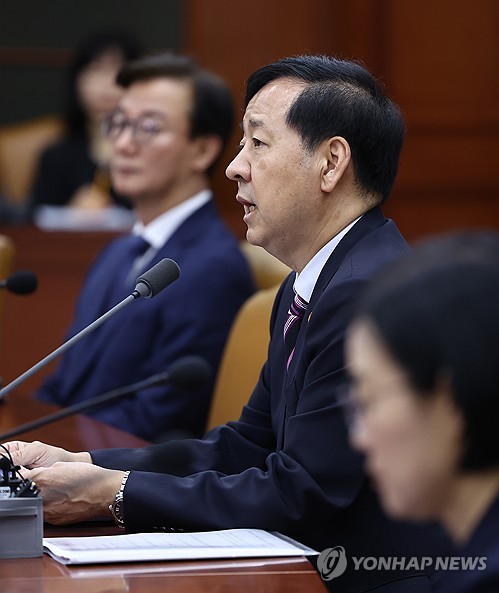
(Seoul=Yonhap Infomax) In the classic Chinese novel "Romance of the Three Kingdoms," Lü Bu is depicted as a figure of great valor. This reputation gave rise to the saying, "Among men, Lü Bu; among horses, Red Hare," underscoring his status as a symbol of martial prowess during the Three Kingdoms era. However, his end was far from glorious. Despite his formidable reputation, Lü Bu was ultimately captured and executed by Cao Cao, not in open battle but after being besieged in Xiapi Fortress. In the end, he was remembered as a 'coward.' This behavior inspired the modern Korean slang 'Bang-guseok Lü Bu,' referring to someone who is brave only within the confines of their own room.
Recently, the term 'Bang-guseok Lü Bu' has resurfaced on the Ministry of Economy and Finance's (MOEF) internal bulletin board, drawing attention. Although legislative work on the government reorganization plan has concluded, internal backlash within the MOEF remains intense. The ministry is grappling with a sense of loss after relinquishing its budget authority to the newly established Ministry of Planning and Budget, and failing at the last minute to absorb domestic financial policy functions from the Financial Services Commission (FSC). This has left many MOEF officials feeling powerless. One MOEF staff member, in a post titled "The Crushing Defeat of the Bang-guseok Lü Bu," directly criticized senior officials, saying, "Don't just assign us work—show some concern for the organization, whether by demonstrating your strength externally or otherwise." The employee added, "Even with a sense of duty, we lack the means to do our jobs. Without budget or financial authority, how can we coordinate and oversee economic policy?"
Under the revised Government Organization Act, the MOEF will be responsible for overall economic policy coordination, taxation, treasury, international finance, and public institution management. While these functions are not insignificant, the MOEF has traditionally been regarded as South Korea's 'economic control tower,' with its minister concurrently serving as Deputy Prime Minister. The sense of loss and frustration among MOEF staff is therefore understandable. The vice minister chairs vice-ministerial meetings, while the minister presides over major gatherings such as the Economic Ministers' Meeting and the Industrial Competitiveness Enhancement Meeting. The MOEF has historically played a powerful coordinating role in policy formulation and crisis response, largely due to its control over budget and taxation—and, until now, its influence over financial policy. From January 2 next year, however, the ministry will have to exercise control in a fundamentally different environment.
With the law already passed by the National Assembly and promulgated by the Cabinet, there is no turning back. Significant personnel adjustments are expected by year-end, and the current atmosphere of uncertainty is likely to persist. Many MOEF staff—often considered the 'best of the best' among civil servants, especially at the deputy director and director levels—are reportedly questioning whether they should remain at the ministry. While this situation is far from ideal, it cannot be ignored.
In a recent survey conducted by the MOEF labor union ahead of the Chuseok holiday, 94% of respondents agreed that "at a minimum, staff opinions should be collected and reflected, such as through a survey on preferred ministries in the event of organizational separation." Additionally, 93% agreed that "the personnel department should not block transfers to other ministries." Although only 421 out of 1,387 employees responded, the results provide a clear sense of the prevailing mood. Notably, many deputy directors—the ministry's core workforce—actively participated, highlighting the depth of internal concern.
For the MOEF to continue serving as the economic control tower despite reduced manpower and functions, the authority of the ultimate personnel decision-maker within the government must be clearly asserted—in other words, the President's backing is essential. In the public sector, influence is determined by either control over money (budget or finance) or proximity to presidential power. Without either, the ministry cannot drive policy. To avoid perceptions that the reorganization was a punitive measure for noncompliance, the MOEF must be given appropriate roles and responsibilities. It is unrealistic to expect other ministries to follow the Deputy Prime Minister's lead based solely on the title.
The current administration, which began without a transition committee, has operated in an 'emergency mode' for months. Now that the Cabinet is in place and the reorganization is complete, a return to normal operations is needed. There is growing talk that the real economic control tower is now the Presidential Office's Policy Office, which has taken the lead on nearly all major economic issues, often communicating through Policy Chief Kim Yong-bum. Some MOEF insiders even joke that Deputy Prime Minister Koo Yun-chul is limited to discussing only artificial intelligence and fiscal expansion. Many see him as just one of many attendees at meetings chaired by the Presidential Office.
Ultimately, what matters is who controls the message reaching the market. With the Policy Chief conducting wide-ranging interviews, including on YouTube, and delivering key messages, the market no longer regards the Deputy Prime Minister as the economic control tower. In this context, the Deputy Prime Minister's words carry little weight. If this is the case, the necessity of the position itself comes into question. If the government still intends to utilize the MOEF as the economic control tower, a clear division of roles between the Policy Office and the MOEF is essential, especially in terms of message management. As long as the current imbalance of power persists, other ministries will not follow the MOEF's policy coordination. It is easier for them to look to Yongsan (the Presidential Office), so there is little incentive to do otherwise. The fact that the Senior Secretary for Growth Economy—a post traditionally held by MOEF alumni—has remained vacant for four months without issue suggests that Yongsan has no intention of changing the status quo. This is regrettable.
(Economics Editor)
pisces738@yna.co.kr
(End)
Copyright © Yonhap Infomax Unauthorized reproduction and redistribution prohibited.

